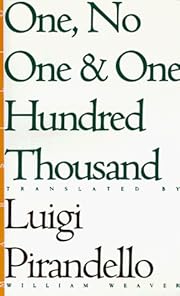

Clica una miniatura per anar a Google Books.
|
S'està carregant… One, No One, and One Hundred Thousand (1926)de Luigi Pirandello
 No hi ha cap discussió a Converses sobre aquesta obra.   ) )Uno, nessuno e centomila è stato il primo romanzo che ho letto dello scrittore siciliano Luigi Pirandello e mi ha conquistata dalle prime pagine. Non è un libro lungo, è vero, ma in sé racchiude una complessità, una profondità ed una sensibilità che lo rendono lungo tanto quanto lo è un libro di cinquecento pagine. Non è una lettura da prendere alla leggera, da affrontare a cuor leggero, in maniera superficiale. Questo non è uno di quei libri che possono essere letti anche se stanchi, con le palpebre pesanti dal sonno, no. Uno, nessuno e centomila è un soliloquio della lunghezza di duecento pagine, un’argomentazione complessa, ricca d’esempi e di confutazioni, ma, soprattutto, è un ironico e intricato dialogo con il lettore, che non può non ritrovarsi in ogni affermazione folle eppure tremendamente vera di Vitangelo Moscarda, il protagonista. Ci sono passi lenti, complessi ed articolati che spesso ho dovuto rileggere per comprenderli davvero, ma nel complesso, a lettura terminata, non posso non dire che ho amato questo romanzo, di natura filosofica, dalla prima all’ultima pagina. Sense ressenyes | afegeix-hi una ressenya
Pertany a aquestes col·leccions editorialsContingut aRomanzi et teatro ( Il fu mattia pascal - Uno, nessuno e centomila- Sei personaggi in cerca d'autore - Enrico IV) de Luigi Pirandello
Pirandello began writing it in 1909. In an autobiographical letter, published in 1924, the author refers to this work as the "[B]itterest of all, profoundly humoristic, about the decomposition of life." Vitangelo, the protagonist, discovers by way of a completely irrelevant question that his wife poses to him that everyone he knows and everyone he has ever met has constructed a Vitangelo persona in their own imagination and that none of these personas corresponds to the image of Vitangelo that he himself has constructed and believes himself to be. The listener is immediately immersed in a cruel game of confusing projections, mirroring the reality of social existence itself, which imperiously dictate their rules. As a result, the first, ironic "awareness" of Vitangelo consists in the knowledge of that which he definitely is not; the preliminary operation must therefore consist in the spiteful destruction of all of these fictitious masks. No s'han trobat descripcions de biblioteca. |
Debats actualsCapCobertes populars
 Google Books — S'està carregant… Google Books — S'està carregant…GèneresClassificació Decimal de Dewey (DDC)853.912Literature Italian Italian fiction 1900- 20th Century 1900-1945LCC (Clas. Bibl. Congrés EUA)ValoracióMitjana: (3.88) (3.88)
Ets tu?Fes-te Autor del LibraryThing. |
||||||||||||||||||||||||||||||||||||||||||||||||||||||||||||||||||||||||||||||||||||||||||||||||||||||||||||||||||||||||